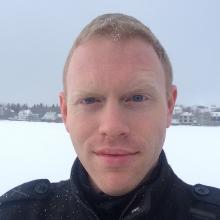I undertook a two-semester departmental honors project in which I completed an original translation of the Old Norse poem Atlakvitda from the Poetic Edda for the purposes of aiding in completing a critical comparative analysis of five major scholarly translations of the poem. The project involved: traveling to Iceland on a Michael D. Wentworth Student Travel Fellowship to study the cultural and physical settings of Icelandic literature, studying the Old Norse language's grammar, general orthography and vocabulary to the degree necessary in order to produce literal translations, reading widely in the areas of Icelandic history, culture, and literature, translating the poem's 44 stanzas into English, researching modern translation theory, examining the critical literature surrounding the poem, and writing the thesis-length final essay.
Several years ago I happened upon a book of Old Norse poetry called the Poetic Edda while browsing in a local bookstore. I had no experience with Icelandic or Old Norse literature at the time and, with a little investigation, soon discovered that there is a vast expanse of literature and scholarship in the area and found the subject to be fascinating. I was fortunate enough to receive a Michael D. Wentworth Student Travel Fellowship in 2014, which allowed me to travel to Iceland the following spring, cementing my interest in Icelandic culture and Literature. Icelanders are proud of their literary heritage, and while in Iceland I found many different English translations of the Poetic Edda and I was surprised at how each translation was so totally unique despite stemming from the same source. I wondered how this could be so, having the effect of kindling my interest in translation theory and in learning Old Norse so that I might know more accurately what is there on the original page. The experience sparked the question, how does each rendering of this text affect the reader and their conception of the narrative? Knowing that Dr. Dan Noland in UNCW English Department has a familiarity with the Old Norse language and with medieval Germanic literature in general, I approached him about the project and worked together with him and, to a lesser degree Dr. Trohimenko in the German department (who has an expert knowledge of Old Norse, among other things) developing the foundational ideas for the thesis and finally pulling it all together into a cohesive plan.
From this project I gained: a deeper knowledge of Icelandic culture and literature, exposure to a niche but robust field of literary study, a foundational knowledge of the Old Norse language which I will be able to continually build on as I take on future products withing the field, exposure to the burgeoning and fascinating academic discipline of translation studies, a deeper understanding of translation--the process, philosophy, and consequences inherent in the act-- and I gained valuable experience in academic research and writing not constrained to the short-form standards of a traditional undergraduate scholarly work.
This project has given me valuable research experience, allowing me to hone my skills and knowledge in an exciting field of study. I am very fortunate to have been accepted into the University at Buffalo: SUNY's English M.A. and I have no doubt that the work I completed in my Departmental Honors project contributed to my acceptance. I believe my work, along with the recommendations of professors whom I have worked closely with on this project, was the primary reason I was selected to enter the program. When I apply to doctoral studies programs after I complete my M.A. I am certain that having completed such a project on the undergraduate level will continue to inform my success a grad student and help me to get into a great Ph.D program, thus increasing the likelihood of entering the crowded and competitive field of professional academics.





